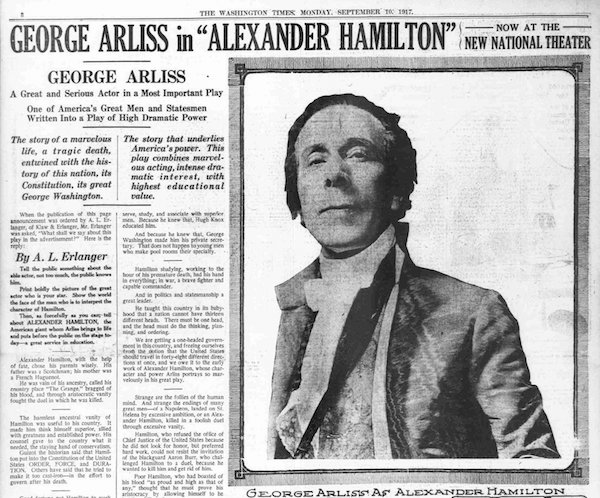
The July 3 premiere of Hamilton on streaming service Disney+ marked the end of a five-year wait for audiences who hadn’t seen the hit musical on stage.
Alexander Hamilton’s rivals in Hamilton concede that he “doesn’t get enough credit for all the credit he gave us.” To the contrary, as Voltairine de Cleyre noted a century ago, Hamilton “devised a financial system of which we are the unlucky heritors,” an economic order designed “to puzzle the people and make public finance obscure to those that paid for it.”
Broadway stage performance might seem a retrograde medium for the likes of Hamilton and The Book of Mormon during the decade when web media went mainstream. To the latter’s co-creator Matt Stone, this merely shows that “if you tell good stories, the platforms are sort of beside the point. We made the most analog thing you can think of, a play at the Eugene O’Neill Theater, and it worked out as well as anything we have ever done.” But as Paul Goodman noted in People or Personnel, the capital-intensive, high-risk nature of Broadway (or Off Broadway aspiring to move off Off) “powerfully influences the choice of plays and style of acting and production.”
Skyrocketing rents in and around the Broadway theater district in midtown New York City — with access to real estate depending on political favors rather than business skill — restrict the space available to fresh talent. A production like Beetlejuice which reliably draws devoted crowds can be shuttered due to lack of available theater space. The Drama Book Shop, the space where Hamilton‘s Lin-Manuel Miranda penned his previous Broadway show, In the Heights, was set to close until Miranda personally bailed it out.
For the fortunate shows that make it to Broadway, it can be lucrative to stay there. In the realm of what Goodman calls “un-free enterprise,” restricting supply reaps the benefit of stoked demand without the pressures of competition (while clamping the release valves of legal loopholes or ticket resellers). COVID-era theater shutdowns moved the filmed Hamilton premiere to the Internet instead of movie theaters. If the benefits of withholding had not been artificially inflated, it might have long been viewable via live broadcasting (a la the Metropolitan Opera’s productions since 2006), research collections like the New York Public Library’s Theatre on Film and Tape Archive, or DVDs.
Hamilton arrives on an Internet video landscape well on its way to consolidation. Like Marvel Comics antagonist Galactus, compelled to continually devour entire worlds to survive, Disney has absorbed Pixar, Star Wars, the Muppets, Marvel itself, and even major-studio equal Fox into its vault. Those collections make it to home viewing missing words (including an expletive cut from Hamilton), visuals, or even entire episodes.
As de Cleyre understood, the creativity restricted by Hamiltonianism can best be unleashed by “the voluntary association of those interested in the management of matters of common concern, without coercion of the uninterested or the opposed.”
New Yorker Joel Schlosberg is a contributing editor at The William Lloyd Garrison Center for Libertarian Advocacy Journalism.
PUBLICATION/CITATION HISTORY
- “Time to Drop Hamilton’s Economics,” by Joel Schlosberg, River Cities’ Reader [Davenport, Iowa], 07/06/20
- “Time to drop Hamilton’s economics,” by Joel Schlosberg, Heartland Newsfeed [Nokomis, IL], 07/06/20
- “’All the Credit He Gave Us:’ Time to Drop Hamilton’s Economics,”
by Joel Schlosberg, CounterPunch, 07/08/20 - “’All the Credit He Gave Us:’ Time to Drop Hamilton’s Economics,”
by Joel Schlosberg, Radio Free, 07/08/20 - “Time to drop Hamilton’s economics,” by Joel Schlosberg, Creston, Iowa News Advertiser, 02/05/19
- “Time to drop Hamilton’s economics,” by Joel Schlosberg, Glendale, Arizona Star (both web and print), 07/09/20
- “Time to Drop Hamilton’s Economics,” by Joel Schlosberg, Ventura County, California Citizens Journal, 07/12/20

